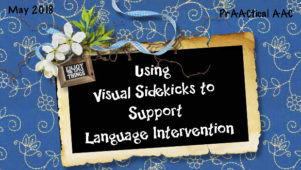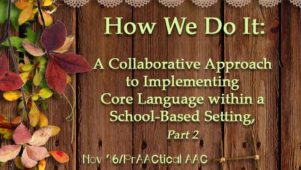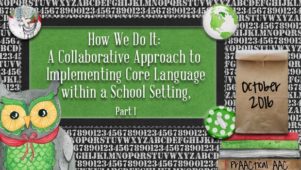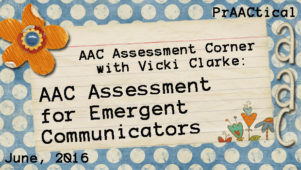May 10, 2018
by Carole Zangari -

SLPs Lori Sanzeri and Chelsea Collins, creators of Core City, are back to share ideas for implementing AAC in the classroom. Today, they share their experiences in using visual supports as a supplemental strategy for their students who are beginning to use AAC. Enjoy! ::::::::::::::::::::::::::::::::::::::::::::::::::::::::::::::::::: Using Visual Sidekicks to Support Language Intervention Have you ever tried to read a book to your students without providing any visual supports? Do you find yourself having difficulty thinking about what questions to ask? Do you ever feel like the story is too “wordy” or difficult for your students to understand? Have no fear, Visual Sidekicks are here! Visual Sidekicks provide a color-coded communication board of target core and fringe vocabulary along with sentences of 3-5 symbols that simplify the text throughout the story. Children with special needs often demonstrate difficulties during structured literacy activities in the following areas: attending to... [Read More...]
November 10, 2016
by Carole Zangari -

We’re excited to welcome back SLPs Lori Sanzeri and Chelsea Collins, creators of Core City, to tell us more about implementing this approach. They both work for the NYC Department of Education and created Core City to promote classroom-wide support of AAC. Last month, they introduced us to Core City. In this post, they share some of the ways that they get everyone involved in using and teaching AAC. STAFF TRAINING The most difficult part of training all staff is finding the time. We are fortunate to have a supportive administration that understands the importance of communication and works to find time to allow us to meet for professional development. If you are not afforded this time, our experience has shown us that the most successful staff training occurs by us modeling our strategies while we are working with the children in the classroom. We encourage the following strategies to... [Read More...]
October 27, 2016
by Carole Zangari -

Nothing makes us smile like seeing teams in which professionals serving students with AAC needs work together to ensure that those students can use and grow their language skills. In this guest post, we learn about an approach that has worked for one such team, Lori Sanzeri and Chelsea Collins. Lori Sanzeri, MA CCC-SLP, TSHH, received her B.S. in Speech Language Pathology from SUNY Cortland in 2003 and M.A. from St. John’s University in 2009. She has worked for the NYC Department of Education since 2003 and teaches AAC and phonetics at St. John’s University. Chelsea Collins, MS CCC-SLP, TSSLD, received her B.S. in Special Education from Seton Hall University in 2009 and M.S. in Communicative Sciences and Disorders from New York University in 2012. She has worked for the NYC DOE since 2012 and specializes in AAC and early intervention. They are on Instagram as @thelanguageladies and have a Facebook page as... [Read More...]
June 1, 2016
by Carole Zangari -

Today, we welcome back Vicki Clarke with more helpful information on conducting AAC assessments. If you work with individual who are at the early stages of communicative development, this post is for you! :::::::::::::::::::::::::::::::::::::::::::::::::::::::::: Some of my most favorite students are those who, at first, may not seem to notice me at all. Sometimes these students seem to exist in their own worlds. They don’t seem to respond in ways we would expect: looking, attending, listening, or gesturing. They may have a diagnosis of Autism, significant developmental delay, epilepsy, or any number of syndromes. I love these kids, and unfortunately, these are often the students who don’t get referred to me. Sometimes it takes years of working in a district before I get to see students with significant developmental delays. These children are typically served in classrooms for students considered to be severe/profound or multi-handicapped. Honestly, I usually get the... [Read More...]



